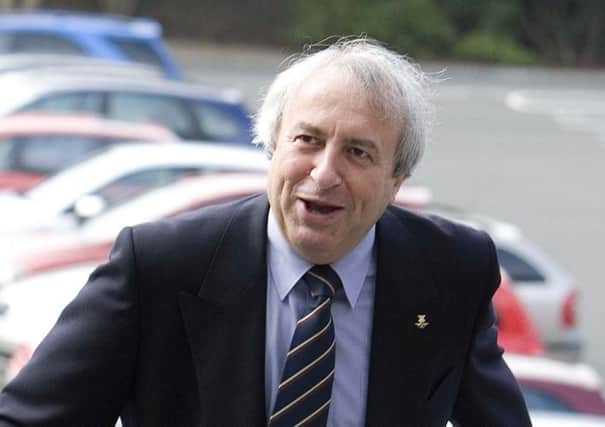Obituary: Thomas Brown McMaster, Partick Thistle FC chairman


After a long and courageous battle with cancer, Brown McMaster died peacefully on Thursday at his home on the south side of Glasgow.
It was an institution on the north side of the Clyde, however, with which he will always be associated. Partick Thistle FC, in a very real sense, owes its survival to McMaster, who was a shareholder, director and twice chairman of the club based at Firhill Stadium in the Maryhill area of the city.
Advertisement
Hide AdAdvertisement
Hide AdHe was born the son of local builder, Thomas McMaster, and raised not too far from Maryhill at Knightswood, attending Hillhead Primary and Hillhead High School.
Always known as Brown, McMaster joined the family firm, now Thomas McMaster and Son Ltd, which was based at Anderson Street in Partick. He was instrumental in its expansion after the great storm of January 1968, which proved a boon to building and roofing contractors like McMaster’s.
Joining officially in April 1969, McMaster oversaw the expansion of the firm into new sub-contract work for private house builders, and he also snapped up slaters’ and plasterers’ businesses, absorbing their labour forces successfully into the main company.
In this respect the McMaster company was ahead of its time, because they had a ready resource of experienced tradesmen to help with the innovative apprenticeship programme he presided over in the 1970s and 1980s. His sons, Craig and Scott, continue the family tradition and are current directors of the firm.
Being based in Partick, the “Jags” or the “Maryhill Magyars” were the local team, famously Glasgow’s “other” team but with a fiercely loyal following at Firhill.
In 1971, they surprised the football world with a superb 4-1 victory over Jock Stein’s Celtic in the Scottish League Cup Final, a triumph that is marked even today with the club’s telephone number that ends 1971.
Even in the early 1980s in the first incarnation of the Scottish Premier League, they could boast the likes of Scotland goalkeeper Alan Rough and young striker Maurice Johnston, as well as Tony Higgins and Brian Whittaker, under the captaincy of Alex O’Hara, but after relegation in 1982, Thistle were destined to spend a decade in the second flight of Scottish professional football, the old First Division.
In May 1989, McMaster became a director at the invitation of the board, which was shortly to be overhauled. Jim Oliver of the Windex company bought out chairman Jim Donald and vice-chairman Kevin Moore and became chairman himself, appointing Brown McMaster as vice-chairman.
Advertisement
Hide AdAdvertisement
Hide AdOliver masterminded the reconstruction of Firhill, and on the field the Jags’ fortunes improved under manager John Lambie, promotion to the top flight being achieved in 1992.
McMaster increased his shareholding in the club to be second only to Oliver, and for a while Thistle even made money under a dynamic chief executive, Jez Moxey.
But a disastrous end to season 1995-96 saw the club relegated in a play-off match with Dundee United, and Thistle fall was precipitous.
Oliver left in early 1997, and McMaster also resigned as a director, fearing a possible takeover by the Steedman family, former owners of Clydebank FC.
Deep in debt, it seemed Thistle might not survive, especially when the takeover collapsed, but the supporters rallied behind the “Save the Jags” campaign and in November 1997, McMaster re-joined the board, this time as chairman.
While the Save the Jags campaign worked round the clock to raise funds to keep Thistle going – at one point it was losing £10,000 per week – McMaster and accountant Tom Hughes were tireless in their efforts to stave off the club’s creditors and deal with the footballing and tax authorities.
A new Thistle emerged, with new directors and McMaster at the helm. At the same time his diligence and enthusiasm was being noted in the upper circles of the Scottish Football League and Scottish Football Association.
Thistle had been relegated to the Second Division, as was, during the crisis, but manager Lambie returned to lead the Jags to back-to-back promotions so that Thistle were once again in the Premier League by season 2002-2003.
Advertisement
Hide AdAdvertisement
Hide AdMcMaster’s principled conduct during the SPL’s almost Machiavellian manoeuvres at the end of season 2003-04 won him many admirers.
Thistle were due to be relegated, but the “other jags”, Inverness Caledonian Thistle, had not met the stadium criteria in time.
Nevertheless, Caley Thistle were eventually promoted, and while Tom Hughes had taken over as chairman, it was McMaster who impressed with his efforts behind the scenes.
Continuing as a director at Maryhill, he joined the Scottish Football League Management Committee in 2005, and became SFL president in his own right in 2008, at which time he left the Thistle board.
At their invitation, he joined the board of Stenhousemuir FC in July 2008, lending the club his great experience until stepping down in April 2010. By then he was already ill, and had resigned as SFL president in November 2009.
Away from football, McMaster was a keen curler and golfer, at one time captaining Pollok Golf Club, and was five times president of Newlands Tennis Club near his home. He played a full part in that community, holding numerous offices at Newlands South Church as well as joining in the work of his local community council.
He was always well respected in business, and this personable man was a great asset not only to the family firm but many the other organisations that he joined.
Brown McMaster is survived by his wife Jean, his children Craig, Scott, John and Jill, and grandchildren Ava, Judy, George, Ewan and Kim. His funeral will take place next Thursday, 12 November, in private and will be followed at 12.45pm by a public memorial service in Newlands South Church.